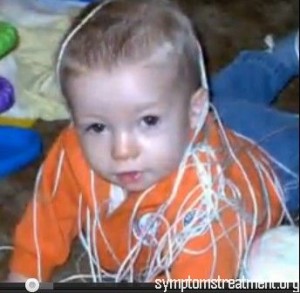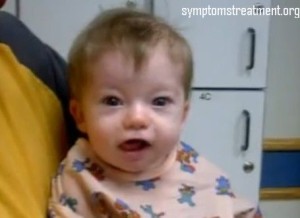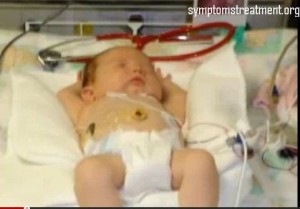DiGeorge syndrome is a physical condition which causes developmental issues related to different body system. The condition is caused due to defect in chromosome, particularly in chromosome 22. The condition leads to various issues such as heart malfunction, inappropriate immune system function, cleft palate issue, etc.
The affected individual may also experience issues related to lowered calcium level as well as behavioral issue. Number of issues as well as their severity may differ greatly. Almost all affected individual need treatment for some particular issues caused due to this condition. They may have to consult a specialist for specific issues. Earlier the condition was formerly known as velocardiofacial syndrome before the finding of chromosome 22. However, contemporarily ‘22q11.2 deletion syndrome’ is a scientific term used frequently as it perfectly describes the condition; nevertheless, previous terms are also in use.
Symptoms of DiGeorge Syndrome
DiGeorge syndrome symptoms may differ drastically based on the type of condition as well as severity. The difference may depend on which body system is influenced due to the syndrome as well as the intensity of the defect. There are some physical symptoms that may be noticed at birth; however, the condition may remain nondescript until early childhood. Here are some symptoms of the physical issue.
• Cyanosis or bluish appearing skin which may result due to circulation blood lacking oxygen
• Weakness and fatigue
• Deterioration or inability to thrive
• Inability to gain weight
• Poor muscular tonus
• Respiratory issues of shortness of breath
• Spasm or twitching sensation around mouth, arms legs and throat
• Inability of the body to fight infection leading to frequent infection
• Lowered appetite or difficulty eating
• Development al delay such as delay in learning to walk, balance, crawling etc
• Delayed speech or language abilities
• Difficulties in learning
• Cleft palate or other palate related issues
• Abnormalities related to facial issues such unusually lower ears or wide eyes etc
Seeing a doctor for DiGeorge syndrome
Seeing a doctor is essential as the symptoms the condition can be easily misunderstood with other issues. Hence, consulting a doctor may help you determine the root cause with certainty. If your child shows any signs or symptoms of the condition it is essential to see a doctor immediately. For example if you notice any bluish appearing skin region on your baby you should ensure to take your child to the doctor. Similarly if you notice that your child suffers from seizures, twitching or spasm etc, then again it is crucial to ask your doctor about the issue.
Causes of DiGeorge syndrome
As mentioned above the DiGeorge syndrome is majorly caused by defect in chromosome 22. Every person carries two copy of chromosome 22, each copy is inherited from each of the parent. There are 500 to 800 genes in chromosome 22. In this condition a portion of chromosome 22 gets deleted. In case a person is affected with the condition then the reason of the condition is a missing segment of chromosome 22. There are approximately 30 to 40 genes mission in this segment. Experts are uncertain about these genes and most of these genes are not identified nor well understood. However, the segment of chromosome that is deleted is referred to as 22q11.2. In some cases the deletion segment would be significantly lesser. This deletion usually occurs in father’s sperm or in mother’s egg; however it may happen during early developmental stage of fetus. This is the reason why the deletion may be repeated in almost all or all cells throughout the body along with development of fetus.
Tests and diagnosis of DiGeorge Syndrome
DiGeorge syndrome diagnosis is mostly based on laboratory examinations that are effective in detecting segment deletion in chromosome 22. You doctor suggest tests or combination of tests based on the symptoms experienced due to the condition. Since, this condition is commonly associated with heart defects; hence, presence of any heart related issue would itself hint your doctor about prevalence this syndrome and your doctor may suggest specific tests. There are chances that some children may show symptoms of 22q11.2 deletion syndrome; however, there may be no indication of deletion of any segment from chromosome 22. Though these cases are diagnostic challenge the treatment and care techniques required may be similar to great extent.
Treatment and drugs for DiGeorge syndrome
There is no complete cure from DiGeorge syndrome; however, there are techniques that can be adopted to reduce the intensity of the affliction. Since, the condition arises due to deletion in chromosome, there is no cure discovered in medical science. However, treatment may focus on rectifying or at least improving critical interpersonal skills as well as social skills. If your child is afflicted with the condition you may require combined care from a team of health care experts. Here is a list of health care professional that you may have to consult.
• Pediatrician
• Experts of hereditary disorders or Geneticist
• Cardiologist or heart specialist
• Immunologist
• Specialists who look after infectious diseases
• Endocrinologist (exert for hormone disorder)
• Maxillofacial surgeon
• Conventional Surgeon
• Speech therapist to help you child overcome speech issues
• Occupational therapist
• Expert to help your child improve age- appropriate skills also known as Developmental therapist
• Pediatric psychologist
Here are possible therapies that may be required based on related issues, in case your child is affected with DiGeorge syndrome:
Hypoparathyroidism:
Hypoparathyroidism in case of DiGeorge syndrome can be managed by using calcium supplements and other supplements such vitamin D as well as one should follow a low phosphorus diet. If most of the parathyroid tissues are not damaged there are chances that affected individuals thyroid gland may gradually regulate calcium as well as phosphorus without any strategized diet.
Limited thymus gland functioning:
Issues related to thymus gland may lead to frequent infection but it may not be of severe type. Children with such issue follow usual vaccine regimen. However, the condition is believed to alleviate as the affected child grows older.
Cleft palate:
issues related to cleft palate can be treated surgically.
There are other issues experienced under such condition which may include heart related issues, developmental issues, psychological health issues etc. These issues are treated accordingly by the doctor and it is best to treat the issue as soon as it is diagnosed. Hence, is you suspect DiGeorge syndrome ensure to consult your doctor immediately.
DiGeorge Syndrome Pictures
Check out pictures of DiGeorge Syndrome to know how children are affected by the syndrome.


